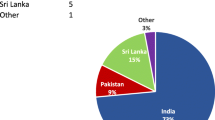Abstract
BACKGROUND
Although end-of-life care preferences vary across racial/ethnic groups, little is known about how cultural values affect end-of-life care preferences among South Asian immigrants and their offspring in the US.
OBJECTIVE
To examine the perspectives of first- and second-generation South Asians living in the US regarding end-of-life care.
DESIGN
Focus group study. Discussions explored participant preferences and experiences with family members facing the end of life.
PARTICIPANTS
Twelve first-generation and 11 second-generation self-identified Asian Indians living in the mid-Atlantic region.
APPROACH
Content analysis of focus group transcripts.
RESULTS
First-generation participants ranged in age from 41 to 76 years and were evenly split by gender. Second-generation participants ranged in age from 23 to 36 years and included seven women and four men. All participants were highly educated, and two thirds were either studying or working in a health care field. All but two subjects were Hindu. Several themes emerged that highlighted cultural differences and challenges for this population in the context of end-of-life care: attitudes toward death and suffering; family duty; and preferences for information disclosure and decision making. Participants described cultural challenges due to the evolution of traditional roles, lack of explicit discussion between patients and family members about preferences and care expectations, and a tension between wanting to meet traditional expectations and the challenges in doing so given US social realities.
CONCLUSIONS
Traditional cultural values, such as duty to family, greatly influenced end-of-life care preferences and retained importance across generations. Clinicians caring for Asian Indian patients at the end of life may be better able to assess care preferences after exploring the complex interplay between traditional expectations and specific social realities for each patient. Particular attention should be given to attitudes toward death and suffering, family duty, and preferences for information disclosure and decision making.
Similar content being viewed by others
REFERENCES
Committee On Quality Of Health Care In A, Medicine I. Crossing the Quality Chasm: A New Health System for the 21st Century: National Academies Press; 2001.
Johnstone MJ, Kanitsaki O. Ethics and advance care planning in a culturally diverse society. J Transcult Nurs. 2009;20(4):405–16.
Ngo-Metzger Q, Legedza AT, Phillips RS. Asian Americans' reports of their health care experiences. Results of a national survey. J Gen Intern Med. 2004;19(2):111–9.
Saha S, Arbelaez JJ, Cooper LA. Patient-physician relationships and racial disparities in the quality of health care. Am J Public Health. 2003;93(10):1713–9.
Murray-Garcia JL, Selby JV, Schmittdiel J, Grumbach K, Quesenberry CP Jr. Racial and ethnic differences in a patient survey: patients' values, ratings, and reports regarding physician primary care performance in a large health maintenance organization. Med Care. 2000;38(3):300–10.
Blackhall LJ, Frank G, Murphy S, Michel V. Bioethics in a different tongue: the case of truth-telling. J Urban Health. 2001;78(1):59–71.
Blackhall LJ, Frank G, Murphy ST, Michel V, Palmer JM, Azen SP. Ethnicity and attitudes towards life sustaining technology. Soc Sci Med. 1999;48(12):1779–89.
Blackhall LJ, Murphy ST, Frank G, Michel V, Azen S. Ethnicity and attitudes toward patient autonomy. JAMA. 1995;274(10):820–5.
Frank G, Blackhall LJ, Michel V, Murphy ST, Azen SP, Park K. A discourse of relationships in bioethics: patient autonomy and end-of-life decision making among elderly Korean Americans. Med Anthropol Q. 1998;12(4):403–23.
US Census Bureau. S0201. Selected Population Profile in the United States, Asian Indian alone, 2006–2008 American Community Survey 3-Year Estimates. 2008. Accessed August 25, 2010.
Rao AS, Desphande OM, Jamoona C, Reid CM. Elderly Indo-Caribbean Hindus and end-of-life care: a community-based exploratory study. J Am Geriatr Soc. 2008;56(6):1129–33.
Doorenbos AZ, Nies MA. The use of advance directives in a population of Asian Indian Hindus. J Transcult Nurs. 2003;14(1):17–24.
Deshpande O, Reid MC, Rao AS. Attitudes of Asian-Indian Hindus toward end-of-life care. J Am Geriatr Soc. 2005;53(1):131–5.
Marin G, Sabogal F, Marin BV, Otero-Sabogal R, Perez-Stable EJ. Development of a short acculturation scale for Hispanics. Hisp J Behav Sci. 1987;9(2):183–205.
Crabtree B, Miller W. Doing Qualitative Research. 2nd ed. London: Sage; 1999.
Yoo GJ, Kim BW. Remembering sacrifices: attitude and beliefs among second-generation Korean Americans regarding family support. J Cross Cult Gerontol. 2010;25(2):165–81.
Laidlaw K, Wang D, Coelho C, Power M. Attitudes to ageing and expectations for filial piety across Chinese and British cultures: a pilot exploratory evaluation. Aging Ment Health. 2010;14(3):283–92.
Kobayashi KM, Funk L. Of the family tree: congruence on filial obligation between older parents and adult children in Japanese Canadian families. Can J Aging. 2010;29(1):85–96.
Miles SH, Koepp R, Weber EP. Advance end-of-life treatment planning. A research review. Arch Intern Med. 1996;156(10):1062–8.
Bito S, Matsumura S, Singer MK, Meredith LS, Fukuhara S, Wenger NS. Acculturation and end-of-life decision making: comparison of Japanese and Japanese-American focus groups. Bioethics. 2007;21(5):251–62.
Acknowledgments
The authors wish to thank all of the study participants for sharing their stories with us.
Conflicts of Interest
None disclosed.
Prior Presentations
Partial data from this study were presented at the Society of General Internal Medicine’s 34th Annual Meeting in Phoenix, AZ, on May 5, 2011.
Financial Disclosures
Funding for this project was provided through a grant from the Osler Center for Clinical Excellence at Johns Hopkins. Dr. Carrese’s effort was supported by the Morton K. and Jane Blaustein Foundation, Inc.
Author information
Authors and Affiliations
Corresponding author
Rights and permissions
About this article
Cite this article
Sharma, R.K., Khosla, N., Tulsky, J.A. et al. Traditional Expectations Versus US Realities: First- and Second-Generation Asian Indian Perspectives on End-of-Life Care. J GEN INTERN MED 27, 311–317 (2012). https://doi.org/10.1007/s11606-011-1890-7
Received:
Revised:
Accepted:
Published:
Issue Date:
DOI: https://doi.org/10.1007/s11606-011-1890-7



